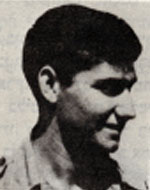Benjamin, son of Citton and David, was born on June 15, 1950, in Iraq, when he was three months old when his family immigrated to Israel and settled in Ashkelon, where he had a special talent for liking people. On the contrary, when he had to lend a helping hand, he was the first son to do so, and in the Ashkelon elementary school he excelled in his studies, and also engaged in social activities in the Hanoar Haoved movement. The social framework of the movement, and when he enrolled in the Mikveh Israel high school, he was very sorry that he had to leave. He devoted most of his spare time to organizing social activities, and his door was always open to his many friends: Benjamin was drafted into the IDF in early August 1968 and assigned to the Engineering Corps. In the framework of his service, he underwent many courses: a platoon commander’s course, a course for infantry commanders, a course for infantry commanders, a parachute course, an officers’ course, a course for officers of the IDF and officers of the army. “My son was an example of a loyal and devoted commander. He treated his subordinates with friendship, his orders he gave in a soft but demanding voice, and everyone obeyed him. Benny faithfully performed every assignment he was given, and often did beyond what was required by virtue of his job. He cared for his children like his sons. When they were working in the minefield, he would lower his ranks and join them. They would turn to him with personal problems, and he would listen and try to help. “His students said:” When we left Jabel Atka, we started working in a minefield. My son was the first to enter the area. He had a great deal of courage, and he knew that everything he did – for the sake of the Jewish people he did. When my son left us, everyone burst into tears. “They also said:” We once went to a cluster and found a wounded Egyptian lying in the minefield. My son went up to him and called him in Arabic to get out of the field. After leaving, he was given food and medical care. “One of his friends recalled:” I loved going out with my son for tours, operations, operations and pursuits. We would speak openly and freely, and he would smile all the time. It was really a pleasure to work with him. “During his Yom Kippur War, he served in the southern front and took part in the most difficult battles, and luckily he was not hurt:” Under heavy shelling my son acted like a real officer. He stood up straight and gave orders. He was the first to introduce the idea of the member command. Every order had a request, and we were always quick to execute his orders with joy. His top priority was carrying out the tasks. At the fear mountain “Akka”, he helped us smile and sing. He was very generous, distributed his mouthpiece to every soldier, and when a soldier called him, he left his meal behind him and went out to meet him. During the fighting, he felt pain for his soldiers. He risked himself for every little thing, just to be good to his soldiers. All the soldiers in the unit still remember that night when Egyptian soldiers raided us, and it was only because of his cold temper and courage that Benny managed to take control of the situation. When a soldier refused to obey an order, Benny sat with him and explained why he should obey. When soldiers were caught in despair during the war, it was my son who reassured them and raised morale. My son was the most expensive commander we ever had. “On December 13, 1973, Benny entered a minefield and began to work, and was suddenly taken to the cemetery in Ashkelon Left behind a mother, five brothers and seven sisters.In a letter of condolence to the bereaved family, Defense Minister Moshe Dayan wrote: “Binyamin was defined as a dedicated officer,A talented, well-to-do Jewish family. “His family donated a Torah scroll to a synagogue in Ashkelon.
